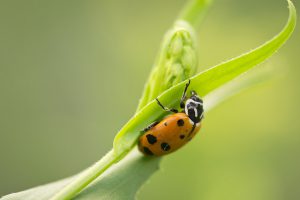Pest control from predators is more efficient on organic farms
 Photo Credit: Matthew
Photo Credit: Matthew
A new study published in Biological Control has found that beneficial predators and parasitoids are more effective at controlling agricultural pests on organic farms than they are on conventional farms. Researchers sought to test the hypotheses that biodiversity is higher on organic farms and that natural pest control via beneficial predators and parasitoids would be higher on organic farms. The study was carried out in Italy, which produces almost one quarter of all vegetables in Europe, on two common crops, red chicory and white cabbage. Five pairs of farms, one under organic management and one under conventional management were chosen as study sites. Chicory and cabbage plots on each farm were sampled for beneficial predator insects and crop damage was assessed. They found that the total number of leaf eating pests were almost 2.5 times greater on conventional farms than organic farms. The also found that both the number of species of beneficial insects were greater on organic farms and that they were much more abundant. Finally, while crop damage on chicory was not quantifiable, there was no significant difference in plant damage on organic and conventional farms. These results demonstrate that organic farms host higher levels of beneficial insects which can be just as effective in controlling pests providing an environmentally friendly alternative to chemical pest control.



